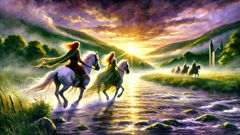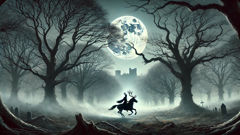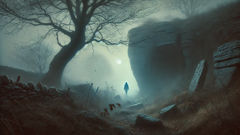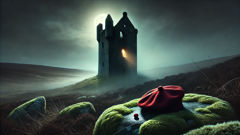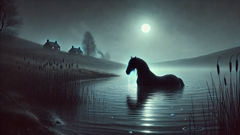Introduction
Ireland’s landscape is a tapestry of mist-laden hills, emerald valleys, and ancient standing stones, each whispering stories older than the winds themselves. On such a land, where myth breathes through every blade of grass and legend hovers like dew on morning clover, lived a hero whose name still resounds through centuries: Oisin, son of Finn McCool. Oisin’s tale is one woven with the shimmering threads of love, longing, and the irresistible pull between two worlds. It is a story born at the hazy edge where reality blurs with enchantment, where the thunder of hoofbeats might be the echo of an ancient army, or merely the heartbeat of a hero torn between what was and what could never be again. For in the days of the Fianna—the legendary warriors of Ireland—Oisin stood tallest among them, his poetry as renowned as his strength, his loyalty as fierce as the wild Atlantic. Yet even the bravest heart cannot resist the call of Tir na nOg, the Land of Eternal Youth, whose promise shimmers just beyond the western horizon. When a figure of ethereal beauty rode from the Otherworld, her golden hair streaming, her eyes like the restless sea, she beckoned Oisin to a realm where joy never fades and sorrow is but a fading shadow. He went, as any soul might, swept away by love and wonder, unknowing that every gift of the faeries carries its price. This is the story of Oisin’s journey—across storm-tossed seas, through timeless gardens, into the arms of immortality—and of the bittersweet cost of yearning for home. Let the mists part and the ancient voices rise. The tale of Oisin in Tir na nOg begins anew.
The Arrival of Niamh and the Call to Tir na nOg
In the heart of ancient Ireland, beneath a sky stitched with swift-moving clouds, Oisin roamed with the Fianna—warriors bound by honor and song. The forests whispered with his laughter, and the rivers carried his verses downstream, for Oisin was as much poet as fighter, his soul attuned to both the wildness of the hunt and the gentle hush of dawn. The years spun their slow circles until, on a day brighter than any before, a vision unfolded on the horizon. From the west, where the sea met sky in a seam of silver mist, came a rider upon a white horse. The steed’s hooves barely seemed to touch the dew-laden grass. Atop it sat a woman whose beauty pierced the hearts of men and stilled the wind itself. Her cloak shone with woven gold, and her hair caught the sunlight in shimmering waves. Her eyes, blue and deep as Lough Corrib, swept over the assembled Fianna and fixed upon Oisin.
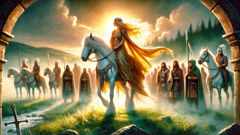
Every warrior fell silent. Finn McCool, Oisin’s father, stepped forward, awe shadowing his strong features. The woman’s voice was music—soft, melodic, echoing with power not of this world. "I am Niamh Chinn Óir—Niamh of the Golden Hair," she announced. "I come from Tir na nOg, the Land of Eternal Youth, across the western sea. I seek Oisin, son of Finn, for no one in my world matches his fame or heart."
Oisin, spellbound, felt as if the land beneath him shifted. The Fianna watched in wonder and apprehension as Niamh told of her home—a place without sorrow or death, where flowers bloomed forever and laughter never faded. Her words painted visions in the air: orchards heavy with fruit, crystal streams singing through endless meadows, halls echoing with music and delight. She beckoned Oisin to join her, to ride the white horse over land and sea to where time itself slept.
Yet Oisin looked to Finn, to his friends whose faces were all he’d known. Duty warred with desire. Finn’s eyes filled with pride and sorrow. He saw the pull of destiny on his son’s heart and knew it was beyond any father’s power to deny. "Go if you must, my son," Finn said, voice thick with feeling. "But remember Ireland. Remember us."
With a heavy heart but a soul alight with longing, Oisin mounted behind Niamh on the magical steed. The horse reared, then sprang forward—not along the road but across the very sea itself. Waves parted beneath their hooves, and salt wind tangled Oisin’s hair as Ireland faded behind him. The air shimmered. Colors deepened. Niamh’s laughter rang through the spray. Oisin clung tight as the land of mortals fell away, and the gates of Tir na nOg swung open before him.
Beyond those gates was a world transformed. The air pulsed with sweet music; scents of honeysuckle and apple blossoms drifted through sun-dappled groves. Golden light bathed the hills, and fountains danced in gardens grander than any king’s. Oisin, awestruck, felt years drop from his shoulders. He laughed, he sang, and for a moment he was not the son of Finn nor the hero of Ireland—he was simply a man in love, lost in a dream made real.
Life in Tir na nOg: Wonders and Joys Beyond Time
Tir na nOg was more than even Niamh’s words could capture. Oisin’s first steps upon its soil felt like treading on velvet grass, and the very air brimmed with sweetness. Days unfolded in perpetual bloom; nightfall never truly darkened the land but softened it with a silver glow. No hunger gnawed, no pain pierced, and every heart beat only for delight.

Niamh led Oisin through gardens where roses never wilted and through forests where songbirds spun golden music. Their palace was built from living stone and glass like dew, its towers twisted with flowering vines. Banquets appeared with a word, and feasts sparkled under crystal chandeliers. There were tournaments of strength and skill; Oisin raced swifter than deer, wrestled with princes, and found himself ever young and tireless. His laughter joined the songs of children who would never grow old.
In the evenings, Niamh would sing by a rippling lake whose waters reflected not the sky but the dreams of those who gazed into them. Oisin, who had always felt Ireland’s beauty rooted deep in his bones, now tasted a paradise that seemed spun from longing itself. Together they rode the fields on the white horse, Niamh’s golden hair trailing behind like a comet’s tail, while Oisin’s heart soared.
But as seasons slipped by—though one could not truly count them—Oisin’s thoughts sometimes drifted back to Ireland. He remembered Finn’s wise counsel, the camaraderie of the Fianna, the wild hunts through oak forests, the shared songs around crackling fires. Memories flickered through his mind like the shimmer of light on Tir na nOg’s fountains. Though every day with Niamh was bliss, something restless stirred within him—a yearning he could not name.
Niamh sensed his longing. She listened as Oisin spoke of Ireland’s hills, of the old tales, of friends and family left behind. In her eyes, sympathy and a hint of sorrow mingled. "This world is made for joy," she whispered, "but it cannot fill a heart shaped by another land."
Time in Tir na nOg was a river with no current, a circle unbroken. Oisin knew not how many days or years passed. Yet the ache for Ireland grew stronger until one golden morning he stood at the edge of a wildflower meadow and said to Niamh, "Let me see my home once more. Let me know what has become of my people."
Niamh’s face grew serious. "If you must go, take my horse. Do not touch the soil of Ireland. As long as you remain on its back, you may return safely. But if you dismount—if your foot touches earth—you will never return to Tir na nOg, and all that is hidden by our magic will be revealed." Oisin promised her, clasping her hands in gratitude and sorrow. With a last embrace, he mounted the white horse and set out for home, the borderlands between myth and memory.
Return to Ireland: The Weight of Time and Fate
Ireland’s shore came into view, grey-green and familiar yet subtly strange. Oisin’s heart quickened as he urged the white horse ashore, careful never to let his foot slip from the stirrup. But as he rode through fields and woods, a chill crept into his bones. Where once had stood bustling villages and sturdy forts there now sprawled ruins shrouded in ivy. The great oaks he remembered as saplings now towered skyward, ancient and gnarled. Not a soul recognized him; not a single voice called his name.
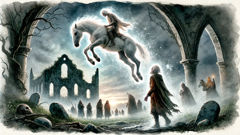
Oisin wandered the length and breadth of Ireland, seeking the Fianna, searching for Finn, but found only silence and the remnants of old glory. Elders whispered of the Fianna as legends long past, their deeds woven into fireside tales. It dawned on Oisin that centuries—not mere years—had flowed while he dwelled in Tir na nOg. He was a stranger in his own land, his heart torn between joy and sorrow.
One day, Oisin came upon a group of men struggling to lift a great stone. They called to him for help, seeing a stranger of unusual strength and bearing. From atop his horse, Oisin leaned to assist. In that moment, the stirrup snapped; his foot touched Ireland’s earth. Instantly, the weight of three hundred years crashed upon him. His red hair turned to white, his back bowed, and his hands grew gnarled and frail. He toppled from the horse, and the magical steed vanished in a flash of silver light.
The men cried out in alarm, gathering round as Oisin struggled to speak. Word of his arrival spread, reaching the ears of learned men—among them the holy man St. Patrick. Hearing of this ancient hero, Patrick sought Oisin and sat beside him under a yew tree as Oisin recounted all that had passed: the days with Finn and the Fianna, the wonders of Tir na nOg, and the love he bore for Niamh. Patrick listened, sometimes sorrowful, sometimes awestruck. He urged Oisin to accept the faith of Christ, but Oisin’s heart remained rooted in the old ways—his spirit too much a part of Ireland’s ancient soul.
Oisin’s final days were spent sharing stories with Patrick, the last living voice of a vanished age. Though his body failed him, his spirit lingered in every tale he told, weaving together Ireland’s past with the shimmering promise of what lay beyond. When at last Oisin closed his eyes for the final time, those who were there said they saw a shimmer in the air—the faint gleam of a white horse galloping west, Niamh’s laughter trailing behind like a song on the wind.
Conclusion
The story of Oisin in Tir na nOg endures because it holds within its folds both the shimmer of magic and the ache of loss. Ireland’s greatest poet-hero tasted joy beyond mortal reach and sorrow no less deep—a love that defied death, a longing for home that time itself could not erase. Oisin’s tale is a reminder that every gift of wonder carries its price, and that even in the land of eternal youth, the heart remembers its beginnings. Through Oisin’s journey, we glimpse the fragile beauty of what it means to belong: to a place, to a people, to a fleeting mortal life. Though Tir na nOg promises escape from all pain, it cannot grant the solace found in memory, in longing, in the courage to face what is lost. As mists swirl over Irish hills and legends ride the evening wind, Oisin’s name endures—a bridge between worlds, and a song echoing across the ages.

